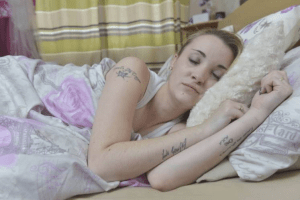A woman with a rare neurological disorder woke up after sleeping for two weeks — and was astonished to discover that she had given birth to her first child.
Jody Robson, 24, believes she has Kleine-Levin syndrome — also known as Sleeping Beauty syndrome — which means sufferers sleep for days or even weeks on end. Her long periods of sleeping are followed by a lengthy recovery time, during which she is in a trancelike state, unable to hear what people are saying.
It was during this dreamlike state that Mrs Robson says she gave birth to her son Harley, following which she immediately fell asleep.
The mom of two from Birmingham, England told the UK Daily Mail: “One moment I’ve closed my eyes and the next I’ve woken up and it’s two or three weeks later. I’ve missed holidays and my sister’s 18th birthday because I was in an episode. It upsets me because I don’t remember giving birth and it’s supposed to be a precious moment. I think that’s the most upsetting episode I ever had. It gets me emotional because I missed it”.
She has slept through Christmas and even very nearly missed her wedding — waking up just days before it.
During her long sleeping periods, Mrs Robson has to be woken by her husband, Steven, at least twice per day to eat a snack, drink water and use the toilet, but she behaves as if she is sleepwalking.
Baby Harley (now 6 and big brother to Riley, 3) was delivered naturally at University of Coventry Hospital, with Mrs Robson in a trancelike state, conscious but unable to understand what the medical staff were saying to her. When she eventually woke up two weeks after giving birth, she looked down at her body and was surprised to see that her baby bump had disappeared.

A typical episode for the young mum consists of at least a week’s sleep and then two weeks of recovery. “The sleeping part is not so scary — it’s the recovery afterwards”, she revealed. “You are scared that you are not going to be out and back to normal again and the days just drag away. I honestly feel that I am sleeping through my children’s lives”.
Despite Mrs Robson’s symptoms, she still hasn’t received an official medical diagnosis, having been tested for epilepsy and narcolepsy with negative results.
Kleine-Levin syndrome is extremely rare, affecting only around 1,000 people in the world (two-thirds of whom are male). It typically begins during adolescence, sometimes after an illness or infection. In Mrs Robson’s case, her first KLS experience was when she was just 12 and living in Alicante, Spain. One day she fell into a deep sleep and didn’t wake up for eight days.
So far there is no cure or treatment that guarantees success for KLS. Sufferers must rely on their family to keep them safe during episodes of slumber and recovery.
Unsurprisingly, Mrs Robson tries her hardest to make the most of the days she is awake, cherishing every moment with her children. “When I have my episodes our lives are on hold”, she said. “My children are so young and I get frustrated that I’m sleeping through their childhood. I just want a diagnosis so I can get some help”. (msn.com)

























